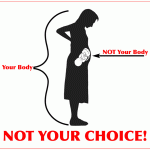Yesterday, the Supreme Court struck down H.B. 2, a Texas law that restricted abortion access by requiring abortion facilities to adhere to unreasonable rules and regulations—rules and regulations that would have forced most abortion facilities in the state to close their doors. This is all matter that has been discussed before—abortions are incredibly safe procedures, safer than colonoscopies for instance, and there’s no need for them to be performed only in ambulatory surgical centers.
The Supreme Court agreed.
I want to focus on Texas Governor Greg Abbott’s response to the ruling:
“The decision erodes States’ lawmaking authority to safeguard the health and safety of women and subjects more innocent life to being lost,” said Texas Governor Greg Abbott. “Texas’ goal is to protect innocent life, while ensuring the highest health and safety standards for women.”
In case it’s not obvious, the references to protecting innocent life are references to preventing abortion. In other words, Abbott is transparently admitting that H.B. 2 was passed in an effort to decrease the number of abortions performed, while claiming that it was also passed to protect women’s health and safety. If these two seem like they’re in contradiction, that’s good—they are. Protecting women’s health and safety, on the one hand, and making it harder for women to access abortion on the other run at cross purposes. Of course, conservatives like Abbott don’t see it that way.
I grew up in the religious right. The parades, the mailings, going door-to-door, the rallies, working the polls—all of it. At one point my politically active father campaigned using the slogan “Pro-Woman, Pro-Life”—and he believed it. My father genuinely believed that being pro-life was the most pro-woman position you could take, because abortion was fundamentally and inextricably harmful to women.
He wasn’t the only one to use this slogan.

It is very likely that Abbott is of this same school of thought. Publicly, though, his administration has been claiming that they passed H.B. 2 in response to the Kermit Gosnell scandal. Gosnell ran an unsanitary and inhumane abortion clinic that preyed on low-income women for decades before he was shut down, arrested, and tried for murder. The problem with the Abbott administration’s logic, though, is that Texas already had regular inspections of clinics that provided abortions, inspections that would catch clinics like Gosnell’s. In other words, H.B. 2 could not be about ensuring that clinics are sanitary and humane, because regulations to that effect were already in place.
I knew, when the Kermit Gosnell scandal broke in the early 2010s, that it would be used as an excuse by anti-aboriton activists to push for more restrictions on abortion clinics—restrictions that wouldn’t stop at ensuring proper sanitation and medical procedures, but would go further in an attempt to shut abortion clinics down altogether. Anti-abortion tactics have evolved over time, and this is only the latest wave. I am all for ensuring that clinics that provide abortions are sanitary and humane. I am not, however, okay with rhetoric about protecting women’s health and safety being used as a trojan horse to make it harder for women to access basic reproductive healthcare.
Abortion access is important to women’s physical and mental health. Many women, including numerous women I personally know, have health conditions that would make pregnancy and childbirth a risky undertaking. This isn’t all that rare, either now or in the past.
Death in childbirth was sufficiently common that many colonial women regarded pregnancy with dread. In their letters, women often referred to childbirth as “the Dreaded apperation,” “the greatest of earthly miserys,” or “that evel hour I loock forward to with dread.” Many, like New England poet Anne Bradstreet, approached childbirth with a fear of impending death.
Yes, we have greater medical knowledge now and pregnancy and childbirth is safer today than it was in the past. But that doesn’t mean it is safe for every woman, or that “safe” means “without any risk of complication.” I’m at an age where an increasing number of my friends are having children, and experiencing some level of complications is typical. Women should be allowed to choose whether or not they want to run these medical risks, and abortion (as well as birth control, of course) allows them to do that.
And this isn’t even touching on mental health. There are many women who do not want to be pregnant or have a child because of a mental health condition, and many others whose mental health would be damaged by being forced to continue an unwanted pregnancy. In other words, abortion access is important to women’s mental healthcare as well.
But let’s return to my father and his slogan for a moment. My father argued that abortion was harmful to women—that women suffer trauma and mental health problems as a result of having an abortion, that they eventually regret their decision, and that abortion comes with many health consequences, including an increased risk of breast cancer. The problem is that none of this is true—or at least, to the extent that it is true that some women may experience some of these things some of the time, the results of denying abortions to women who want them are only worse. The argument that abortion is bad for women makes concrete claims that can be tested—and when tested, they fail.
I am naturally skeptical of anyone who claims to be both in favor of banning abortion and in favor of making sure that the abortion procedure is safe and sanitary—just as I would be skeptical of someone who claimed to both be in favor of equal pay for women and in favor of banning women from working outside of the home. In his statement yesterday, Governor Abbott spoke of protecting “innocent life.” That term, in the parlance of the anti-abortion movement, is a reference to embryos and fetuses, and not to ordinary women simply trying to access healthcare. With this reference—this admission that H.B. 2 did make reducing the number of abortions performed one of its goals—Governor Abbott made it crystal clear that the legislation was never actually about protecting women’s health.
Fortunately, the Supreme Court saw through the ruse. This time.















